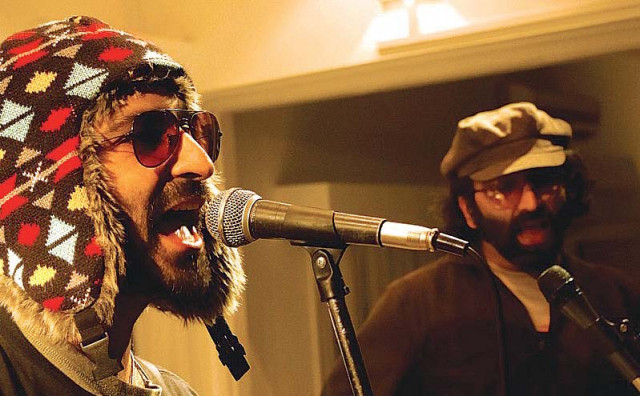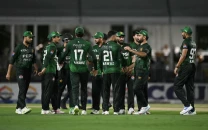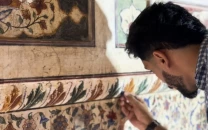Bumbu Sauce: Punking it the Punkjabi way
The punk-rock band from the capital has a candid tête-à-tête with The Tribune Magazine.

Who is Bumbu Sauce?
BUMBU SAUCE: There are four of us — Colonel Bumbu for the guitars and vocals, Master Jee who plays the guitar, Jeevay Lal on the bass and Zakoota on drums.
Why the anonymity? Will the pseudonyms ever wear off to reveal your real identities?
MASTER JEE: Anonymity? Pseudonyms? Whaddiz?
ZAKOOTA: Pseudonym? Isn’t that an anti-inflammatory cream?
COLONEL: We’re out there. We are playing live shows. Then people who attend our shows put our pictures and videos up online. More than that, we command a strong presence on radio — not just songs but also interviews. We’re the opposite of anonymous. Some of our biggest influences in rock have used stage names and that’s actually pretty fun.
Bumbu Sauce is a totally new genre of punk rock, but its comical tilt makes that more difficult to define. What label would you give to your music?
COLONEL: It’s come around for us naturally and so it’s hard to define even for us. You’re right, in the Bistee Proof EP we didn’t go out to make any statements — and it turns out that is our biggest statement.
ZAKOOTA: Think of it as rock ‘n roll wearing a dhoti.
What kind of fan following do you have?
MASTER JEE: The best kind. Our fans are the ones who are as sick of the mainstream as we are.
ZAKOOTA: The loosely described “genre” of our music was different enough that it got a reaction instantly out of most people. It makes me happy to see a very diverse demographic in our fan base. If we can bring everybody together under the Bumbu Sauce flag, we’ve accomplished a fair bit.
Since Bumbu Sauce seems to follow the DIY ethic of Punk to the utter core, other than the live shows you have mentioned, how much has radio and web assisted you guys in promoting your music?
ZAKOOTA: The internet reaction was immediate and radio warmed up to it gradually, once the RJs and programme directors saw that it was the type of music that stayed with people and they wanted to hear it again. We were careful about the order in which the songs on “Bistee Proof” were released. We weren’t going to just release everything simultaneously — it had to have a pattern. I think that groomed the fans to help understand where this band was coming from.
COLONEL: Technology has been key. It’s allowed us to bypass all the formalities and get our music straight to our fans. It’s been amazing to see the response so far. Really amazing. Bistee Proof is our first EP and after the love that we’ve gotten, we can’t wait to put out an album because we know people want it. We know it because they tell us.
MASTER JEE: Web and radio have both been good.
The songs with lyrics that are a cross between Punjabi and English are more comical but “Jiggernaut”, despite its humorous lyrics, has more serious connotations. Did it reach out to global audiences?
COLONEL: Serious? Oh please ... it has ninjas fighting with doggies who speak English and it involves catching fish in China. Still, it’s getting played on radio stations in New Zealand, the US, the UK, Canada ... all over the place.
ZAKOOTA: Some fans have come up with some pretty interesting concepts about the song’s connotations. Take from it what you will.
MASTER JEE: We had recorded a version of that a couple of years ago and put it up on Youtube. It got a fair bit of attention back then, The New York Times, The Guardian, and what not. That kind of media attention really says a lot. All you need to do is mention the T word in a song that makes absolutely no sense, and people start taking it seriously. That wasn’t why we wrote the song, though. The song came together because we were all really, really happy that night. Just ecstatic to be in a band together. The song did pretty well, I guess. But this song like most of our music was a bolt from the blue.
Did you have inkling Punjabi Rock, and that too purely humourous rock, would be a hit with the local Punjabis? Your music had an advantage because the local who does not listen to rock for most of it is in English, can listen to you. Was that part of the plan or has it just happened?
ZAKOOTA: What Bumbu Sauce really does is share their inside jokes with their fans. We’ve all known each a very, very long time. One of us will say a word that is connected to a certain event with a certain teacher in Class 9 and we’ll be laughing our butts off for the next 10 minutes straight. Then we’ll write a song about it. Maybe it’s in Punjabi. Maybe it’s in English. Maybe it’s in both. Although I won’t deny that Punjabi lends itself rather fittingly to rock n’ roll.
MASTER JEE: It just happened. We write songs that we would enjoy playing, and listening to. That’s the only guiding principle we’ve ever had with our music. If we can enjoy playing it and listening to it, it must be good. I think that formula works.
COLONEL: It’s only when we got done recording and putting together the EP that we started thinking about people listening to these songs — groups of friends singing along to it in their bedrooms, living rooms and cars. And that’s been by far the most gratifying part of it.
What was the journey from your personified experience of music to the more professional one? What about the production of your music?
COLONEL: We’ve played together for over a decade but we all had side musical projects. It was about three years ago that Master Jee and I got together to start sketching out fresh material and took it to Zakoota and Jeevay Lal. It started coming together and we wrote some new stuff and decided to go into the recording studio. We were put in touch with Nick Blagona who is a master Buddha of sound in Canada. His studio is on a native American reservation near Toronto. The reservations in North America are exactly like our Federally Administered Tribal Areas.
ZAKOOTA: Colonel and Masterjee had some cool ideas. When all of us sat down, it really starting coming together and we knew that these tunes had to be recorded soon. We recorded at Jukasa Studios, with Nick Blagona at the helm. He did wonders with the drum sound and vocals. We ended up mastering with him as well.
What kind of criticism have you received for your music and from which quarters?
ZAKOOTA: Mostly from people who don’t understand that this type of music but our take on that is, this kind of music doesn’t have to make sense in their minds all the time. And that it doesn’t have to have a well measured out three-minute guitar solo or intricate 3x7x5 drum beats to make it sound good. It’s feel-good music man. Please relax, and chill out with us. Come on and Bumbu Jam.
MASTER JEE: Good music is good music. Who cares about criticism anyway? Definitely not a band who’s first EP is called ‘Bistee Proof’.
Have your predecessors in local rock ever sent some kind of appreciation or critique?
COLONEL: Our friends who are in the music industry have been really supportive. Arieb Azhar, Haniya Aslam, Hamza Jaffery and our peers have been great but from the old timers, no, we haven’t heard anything at all yet...
MASTER JEE: I think they’re still waiting for us to be embraced by toothpaste companies before they invest their ‘cool stock’ in us.
What are the future plans, or as it would be in the Bumbu mode, ‘whaddiz’ the scene?
ZAKOOTA: We just played DesiFest in Toronto, Canada, the largest South Asian festival in North America. The reaction was amazing — we sold out T-shirts and CDs almost instantly. Now that the Space Shuttle Atlantis has had its final lift-off, (Yes, a delay would have dealt a blow to new Bumbu material … really!) we’re all getting together in a couple weeks to hash out some new tunes. These new songs are mind-melting stuff. The band is fully in its comfort zone. Fans can expect nothing short of sheer Bumbuness. After last year’s winter tour, our fans have been waiting very patiently for some shows. We’ve got invitations from Karachi, Lahore, Islamabad and Faisalabad. I’m sure we’ll add a few more cities and we are looking to tour straight through the country in the winter of 2011/2012. We want to layer this country in Bumbu Sauce, understand? Aho!
Punked in Pakistan
Though relatively new to Pakistan, punk music first invaded Western eardrums in the late 1970s as an extension of rock music. The word ‘punk’ conjures up images of unkempt musicians wearing outrageous clothes and sporting mohawks and any number of piercings, and certainly conformity is a big no-no when it comes to Punk music. Gone are the done-to-death themes of love and heartbreak, as no Punk musician worth his mohawk will be caught dead pining for his lost love to return to him
The music industry in Pakistan saw a revival with the rise of the Vital Signs, while Junoon managed to fuse rock music with sufi lyrics. Since then, rock has been simmering, if not steaming, in Pakistan through the genre of Garage Rock or underground bands as well as fusion ventures by pop bands.
Some bands that could be classified as Garage Rock are Malang Party, a boy band which manages to “growl” adequately and play its Blues perfectly. Then there are the Qayas boys, Poor Rich Boy and Co-Ven who have managed to attract rock fans as well as the media’s interest.
But Punk has also come to Pakistan. In terms of popularity , Bumbu Sauce is the latest sensation in Pakistan’s punk scene. They sing in a language you could call Punglish (a cross between Punjabi and English) . Then there is the punk band The Kominas who have their origins in Pakistan but are stationed in Boston, US. Their music, too, is flavoured with an interesting fusion of Punjabi and English but instead of being labelled a Pakistani band, they are better known as a South Asian or ‘brown’ punk band since they have whipped in popular Bollywood songs and borrowed Naseebo Laal’s lyrics to punk them up and win fans in their Pakistani, Indian and foreign audiences.
Seemingly tired of not just mainstream music but also of norms that govern music production, Bumbu Sauce has followed the DIY ethic of Punk and has distributed music on its own through social networking websites.
Published in The Express Tribune, Sunday Magazine, July 17th, 2011.



















COMMENTS
Comments are moderated and generally will be posted if they are on-topic and not abusive.
For more information, please see our Comments FAQ